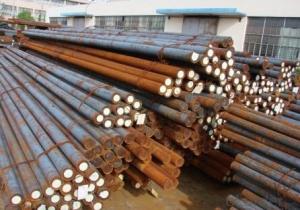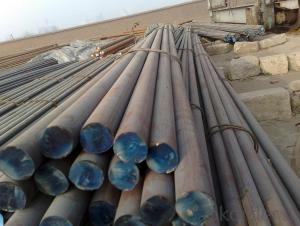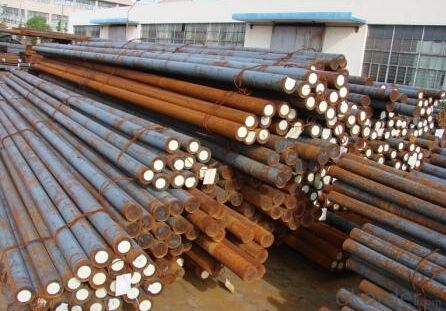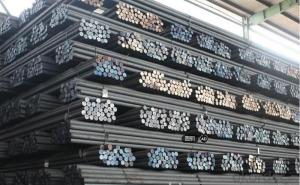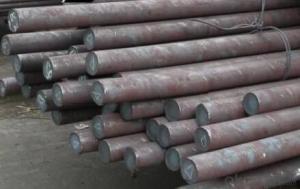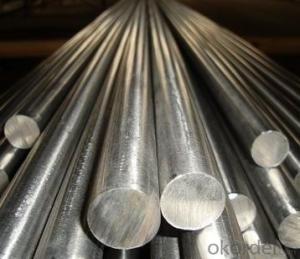Special Steel 40cr Steel Mould Steel Bar
- Loading Port:
- China main port
- Payment Terms:
- TT or LC
- Min Order Qty:
- 25 m.t.
- Supply Capability:
- 10000 m.t./month
OKorder Service Pledge
OKorder Financial Service
You Might Also Like
Specification
The details of our Steel
1. Produce Standard: as the GB, AISI, ASTM, SAE, EN, BS, DIN, JIS Industry Standard
2. Produce processes: Smelt Iron -EAF smelt Billet - ESR smelt Billet -Hot rolled or forged get the steel round bar and plate
3. Heat treatment:
Normalized / Annealed / Quenched+Tempered
4. Quality assurance:
All order we can received Third party inspection, You can let SGS, BV,.. and others test company test and inspect our products before Goods shipping.
Product information
Chemical Composition(GB)%
C | Si | Mn | Cr | Ni |
0.37-0.44 | 0.17-0.37 | 0.50-0.80 | 0.80-1.10 | ≤0.30 |
Heat Treatment
Item | Temperature ℃ | Hardness |
Normalizing | 850-870 | 179-229HB |
Characterstics: Which has the best comprehensive mechanical properties
Applications
1.Can be used for drawing die and plastic mould | |||
2.Can be used for middle and small punch |
Product show

Workshop show

Shipping
1. FedEx/DHL/UPS/TNT for samples, Door-to-Door;
2. By Air or by Sea for batch goods, for FCL; Airport/ Port receiving;
3. Customers specifying freight forwarders or negotiable shipping methods!
Delivery Time: 3-7 days for samples; 5-25 days for batch goods.
Payment Terms
1.Payment: T/T, L/C, Western Union, MoneyGram,PayPal; 30% deposits; 70% balance before delivery.
2.MOQ: 1pcs
3.Warranty : 3 years
4.Package Informations: 1) EXPORT, In 20 feet (GW 25 ton) or 40 feet Container (GW 25 ton)
2)as customer's requirement
Why choose us?
(1) The leading exporter in China special steel industry.
(2) Large stocks for various sizes, fast delivery date.
(3) Good business relationship with China famous factories.
(4) More than 7 years steel exporting experience.
(5) Good after-sales service guarantee.
- Q: What are the applications of special steel in the defense sector?
- Special steel, which is also referred to as high-strength or high-performance steel, has a wide range of uses in the defense sector due to its distinct properties and capabilities. The utilization of special steel in the defense sector can be categorized into different areas: 1. Armor and ballistic protection: In the production of armored vehicles, tanks, and personnel carriers, special steel is extensively employed. Its exceptional strength and hardness make it an optimal material for safeguarding against ballistic threats like bullets, fragments, and explosives. Special steel plates reinforce the structure and provide penetration resistance. 2. Ammunition and weapon components: Various weapon components, such as barrels, bolts, and receivers, are manufactured using special steel. Its remarkable strength, durability, and resistance to wear and corrosion make it suitable for producing firearms and ammunition. Special steel alloys can endure the high temperatures and pressure generated during firing, ensuring dependable performance and durability of weapons. 3. Aircraft and aerospace components: Special steel is employed in the construction of aircraft and aerospace components like landing gears, engine parts, and structural elements. Its high strength-to-weight ratio allows for the production of lightweight yet sturdy components, enhancing the overall performance and safety of military aircraft. Special steel alloys also exhibit excellent fatigue resistance and can withstand high-temperature environments, making them suitable for demanding aerospace applications. 4. Naval applications: Special steel plays a vital role in the naval applications of the defense sector, including the construction of warships, submarines, and naval vessels. Its corrosion resistance, high strength, and toughness make it an ideal material for shipbuilding, ensuring the longevity and structural integrity of naval platforms. Special steel is also used in critical components like propeller shafts, hulls, and others that require exceptional strength and resistance to harsh marine environments. 5. Missiles and rocketry: Special steel is used in the manufacturing of missiles, rockets, and their propulsion systems. Its ability to withstand high temperatures, strength, and resistance to extreme forces make it suitable for producing critical components like rocket nozzles and motor casings. Special steel alloys can endure the intense heat and pressure generated during rocket propulsion, ensuring reliable and efficient performance. In conclusion, the applications of special steel in the defense sector are extensive and diverse. Its unique properties and capabilities contribute significantly to the development of robust, reliable, and high-performance defense systems, ensuring the safety and security of military personnel and assets.
- Q: How does special steel perform under high-temperature conditions?
- Special steel is specifically designed to perform well under high-temperature conditions. It exhibits excellent resistance to thermal expansion, oxidation, and creep, allowing it to maintain its structural integrity and mechanical properties when exposed to elevated temperatures. The unique composition of special steel, which often includes elements such as chromium, nickel, and molybdenum, contributes to its high-temperature performance. These alloying elements form a protective oxide layer on the surface of the steel, known as passivation, which acts as a barrier against corrosion and further enhances its resistance to high temperatures. Additionally, the microstructure of special steel is carefully controlled through various heat treatment processes, such as quenching and tempering, to achieve optimal toughness and strength even at elevated temperatures. Overall, special steel demonstrates exceptional performance and reliability in high-temperature environments, making it a preferred choice for applications such as power generation, aerospace, and petrochemical industries.
- Q: How is special steel used in the production of cutting blades?
- Special steel is used in the production of cutting blades due to its exceptional properties, such as high hardness, toughness, and wear resistance. These properties allow the cutting blades to maintain their sharpness and durability even when subjected to intense cutting forces and repeated use. The special steel's composition and heat treatment processes ensure that the cutting blades are capable of withstanding harsh operational conditions, resulting in efficient and precise cutting performance across various industries, including manufacturing, construction, and agriculture.
- Q: How does special steel contribute to the power generation equipment industry?
- Special steel plays a crucial role in the power generation equipment industry by offering enhanced performance, durability, and reliability. Power generation equipment, such as turbines, generators, and transformers, operate under severe conditions including high temperatures, pressure, and corrosive environments. Special steel, with its unique properties and characteristics, addresses these challenges and contributes significantly to the industry. One of the key advantages of special steel in power generation equipment is its ability to withstand high temperatures. Special steel alloys, such as heat-resistant steels, are designed to perform under extreme conditions, enabling power plants to operate at elevated temperatures without compromising efficiency or safety. These steels maintain their strength, structural integrity, and resistance to creep and fatigue even at the highest operating temperatures, ensuring the reliability and longevity of the equipment. Furthermore, special steel offers excellent corrosion resistance, which is essential in power generation equipment due to the presence of corrosive substances like water, steam, and chemicals. Stainless steel, for instance, is widely used in power plants for its exceptional resistance to corrosion, preventing equipment degradation and minimizing maintenance costs. By using special steel, power generation companies can reduce downtime and enhance overall efficiency. Special steel also contributes to the power generation equipment industry by providing exceptional strength and mechanical properties. This is particularly important for large-scale equipment such as turbines and generators, which are subjected to high mechanical loads. High-strength special steel allows these components to withstand the stress and pressure, ensuring their safe and reliable operation over an extended period. Moreover, special steel's unique properties, such as high hardness and wear resistance, make it suitable for critical components like blades and rotors, reducing the risk of failure and enhancing overall performance. In summary, special steel is an indispensable material in the power generation equipment industry. Its ability to withstand high temperatures, resist corrosion, and provide exceptional strength and mechanical properties ensures the reliability, durability, and efficiency of power plants. By utilizing special steel, power generation companies can enhance their equipment's performance and reduce maintenance costs, ultimately contributing to the sustainable and reliable production of electricity.
- Q: What are the thermal properties of special steel?
- Special steels are highly sought-after in various applications due to their unique thermal properties. A key property of special steel is its exceptional thermal conductivity, enabling efficient heat transfer and dissipation. This characteristic renders special steel perfect for heat exchangers, facilitating effective heat transfer between fluids. Moreover, special steel boasts a high melting point, ensuring its structural integrity even under extreme temperatures. Consequently, it finds suitability in applications that involve exposure to extreme heat, such as furnaces or aerospace engines. Additionally, special steel exhibits superb thermal expansion properties, expanding and contracting consistently with temperature changes. This minimizes the risk of warping or cracking, which is crucial in applications requiring dimensional stability, such as precision instruments or high-temperature machinery. Furthermore, special steel possesses excellent resistance to thermal fatigue. It can endure repeated heating and cooling cycles without developing cracks or weakening. This property proves highly advantageous in applications subjected to cyclic thermal loading, such as automotive engine components or turbine blades. In conclusion, special steel offers high thermal conductivity, a high melting point, exceptional thermal expansion properties, and resistance to thermal fatigue. These desirable thermal properties make it a preferred choice across various industries, including automotive, aerospace, energy, and manufacturing, where thermal performance and durability are paramount.
- Q: What is the significance of tensile strength in special steel?
- Tensile strength is of great significance in special steel because it determines the steel's ability to withstand stretching or pulling forces without breaking or deforming. This property is crucial in various industries, especially in manufacturing and construction, where high tensile strength is required for structural integrity and safety. Special steel with superior tensile strength can withstand heavy loads, resist impacts, and provide durability, making it highly sought after in applications such as building infrastructure, automotive manufacturing, and aerospace engineering.
- Q: Is special steel suitable for manufacturing molds and dies?
- Yes, special steel is well-suited for manufacturing molds and dies due to its exceptional hardness, durability, and resistance to wear and deformation. Special steels like tool steel or high-speed steel possess superior mechanical properties, such as high tensile strength and toughness, making them ideal for withstanding the high pressure and temperature conditions involved in mold and die manufacturing processes. Additionally, special steels can be easily machined and heat-treated to achieve the desired hardness and precision required for creating intricate molds and dies.
- Q: How does special steel perform in high-temperature creep?
- Special steel is specifically designed to perform well in high-temperature creep conditions. Creep refers to the tendency of a material to deform under constant stress over time at elevated temperatures. Special steel exhibits excellent resistance to creep due to its unique composition and heat treatment processes. The alloying elements used in special steel, such as chromium, nickel, and molybdenum, significantly enhance its high-temperature strength and creep resistance. These alloying elements form stable carbides and improve the material's ability to retain its structural integrity even at elevated temperatures. Furthermore, special steel is often subjected to specific heat treatment methods, such as annealing or quenching and tempering, to further enhance its creep resistance. These processes help in refining the microstructure of the steel, reducing the presence of internal stresses, and improving its overall mechanical properties. The combination of alloying elements and heat treatment processes in special steel provides it with exceptional creep resistance. It can withstand prolonged exposure to high temperatures without significant deformation or failure. This makes special steel an ideal choice for applications that involve high-temperature and high-stress conditions, such as gas turbines, petrochemical plants, and power generation facilities. Overall, the performance of special steel in high-temperature creep is outstanding, and it is widely recognized as a reliable and durable material for applications requiring resistance to thermal deformation and long-term stability under constant stress.
- Q: How does special steel contribute to improving product functionality?
- Special steel contributes to improving product functionality in several ways. Firstly, special steel offers enhanced strength and durability, allowing products to withstand higher loads and perform under extreme conditions. It also provides superior resistance to corrosion, which extends the lifespan of products and reduces maintenance costs. Additionally, special steel can be tailored to specific applications, such as high-temperature environments or magnetic properties, further enhancing product functionality. Overall, the use of special steel results in more reliable and efficient products, ultimately benefiting consumers and industries alike.
- Q: How is ultra-high-strength steel used in the construction industry?
- Ultra-high-strength steel is commonly used in the construction industry to enhance the structural integrity and resilience of buildings and infrastructure. Its exceptional strength-to-weight ratio allows for the creation of lighter and more durable structures. This steel variant is often employed in applications such as high-rise buildings, bridges, and offshore structures, where its superior strength properties provide increased safety and load-bearing capacity.
Send your message to us
Special Steel 40cr Steel Mould Steel Bar
- Loading Port:
- China main port
- Payment Terms:
- TT or LC
- Min Order Qty:
- 25 m.t.
- Supply Capability:
- 10000 m.t./month
OKorder Service Pledge
OKorder Financial Service
Similar products
Hot products
Hot Searches
Related keywords
